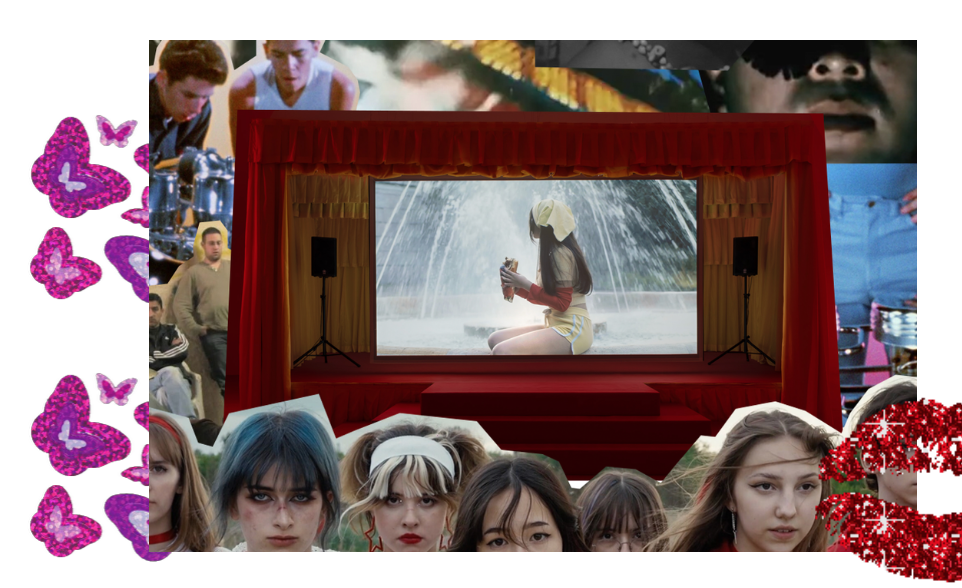published in Polyester, 16.01.2025
The upcoming London Short Film festival at the ICA is set to present over 50 programmes in an eclectic mix of subjects such as female villains, aliens, politics and colonialism. One event, Pop: Contagion, Infection, Revolution, will try to look at how pop culture has become entwined with revolution in the past 50 years. Curated by Cici Peng, the show features experimental moving-image works from 1968 to present day and asks what a ‘pop’ image represents and how it influences us in 2025.

WORDS: ARIJANA ZERIC
I was first made aware of the power of pop in culture in 1997, when then prime minister Tony Blair invited British celebrities to Downing street in an event culminated from the movement that the press labelled ‘Cool Britannia’. Infamously, Blur frontman Damon Albarn declined the invite, voicing skepticism towards the government’s motives, stating “an unpleasant odour of nationalism” had become associated with Cool Britannia and Britpop.
Y2K saw the rise of rich people who were not famous for anything, turning into superstars and being pointedly apolitical without any need for self or cultural expression to find fame. The rise of reality tv and pop became wildly entwined and fame became a currency of its own, regardless of artistic merit..
“Pop has the potential of travelling far, it is catchy by design and can grip the masses in a similar way to political movements. It ends up embedding itself into our consciousness so you end up hearing it everywhere, no matter which country you’re in.” Peng tells me, “The programme, Pop: Contagion, Infection, Revolution, challenges the feeling one gets of pop being a revolutionary force and delivers on the counter side an image of pop being just another tool of global capitalism that keeps us plodding along in this fantasy that it offers.”
It’s interesting to learn that Coffea Arabiga (1968) by Cuban filmmaker Nicolas Landrian got restored only a few years ago. Loaded with bold typography the film appears still quite contemporary. “They refused to restore his work for so long because they knew the film would not align with the national Cuban narrative of socialism.” Peng explains “He was quite an interesting filmmaker who used this song by The Beatles to call out how racialised work in Cuba was not being addressed. Black workers were not treated the same as white workers. It was all set against the image of Fidel Castro.”
Other films like For The Damaged Right Eye (1968) was originally a live performance with experimental pop music and it shows how pop can create this sense of community building and avant-garde work. Director Toshio Matsumuto was part of the radical left leaning filmmakers and they challenged the idea of the then presiding government, featuring images of protest and using faces alongside of music to transcend the barriers between all the different spaces they inhabit.
There’s a reason that Peng uses the 1960s as a starting point. “I think there are generally a lot of similarities between 1968 and the present moment, which is what I was initially really drawn to. The 1960s were the time when pop came to be truly a global phenomenon in line with the rise of global capitalism, globalisation and commercial culture. I think it’s interesting that pop has always been tied in with youth movements, in fact it’s almost inseparable.” She explains, “We think about pop and youth together. Back then, pop could be a revolutionary force containing themes of protest. Look at how The Beatles were actively involved in anti war demonstrations and the way the music is used within these films. The way pop aesthetic is used is in a way directly challenging how we think about capitalism and globalisation which I find really striking.”
Kustom Kar Kommandos (1965) by Kenneth Anger instantly reminds me of Americana – milkshakes and James Dean. Cici details that Anger’s Scorpio Rising (1963) is considered as the first true pop film: “I really wanted to include this film because it’s in direct counter pose to Jumana Manna’s film Blessed, Blessed Oblivion (2010). Jumana was strongly influenced by Kenneth Anger and this idea around cars and masculinity. It’s something that she wanted to subvert and to look at Palestinian identities and Palestinian masculinity and intimacy. When you look at Kenneth Anger’s film there is clearly this development of the pop image, something that’s pastel and colourful with its strange quick cuts and flirtatious camera movements that create a feeling of excitement about this fantasy world that seems more perfect than ours. But actually by contrast it reveals its artifice at the heart of these images.”
If Revolution is a Sickness (2021) by Diane Severin Nguyen is a complex choice in a programme of complex films. It focusses on the large Vietnamese diaspora that exists in Poland, where the youth seems obsessed with K-pop and dances in abandoned former soviet buildings, creating an image of dissonance. When asked about the criteria she had specifically in mind when choosing her line up Cici says: “I only wanted to show experimental films because they are all subverting what the image of pop is, so we’re all very aware of this sound and image and it wanting to expose something. They are all very self reflexive works which is the overarching theme. But they are all historical in a way as they all want to represent a political era through these images which we tend to not associate with anything political. That’s where the force comes from.”
Scénario(s) runs from the 14 – 22 December with accompanying film programme at The Institute of Contemporary Arts (ICA)
PUBLISHED 16.01.2025
London Short Film Festival runs from the 17 – 26 January at multiple locations. Pop: Contagion, Infection, Revolution; 18th of January at the ICA. Tickets on sale here.